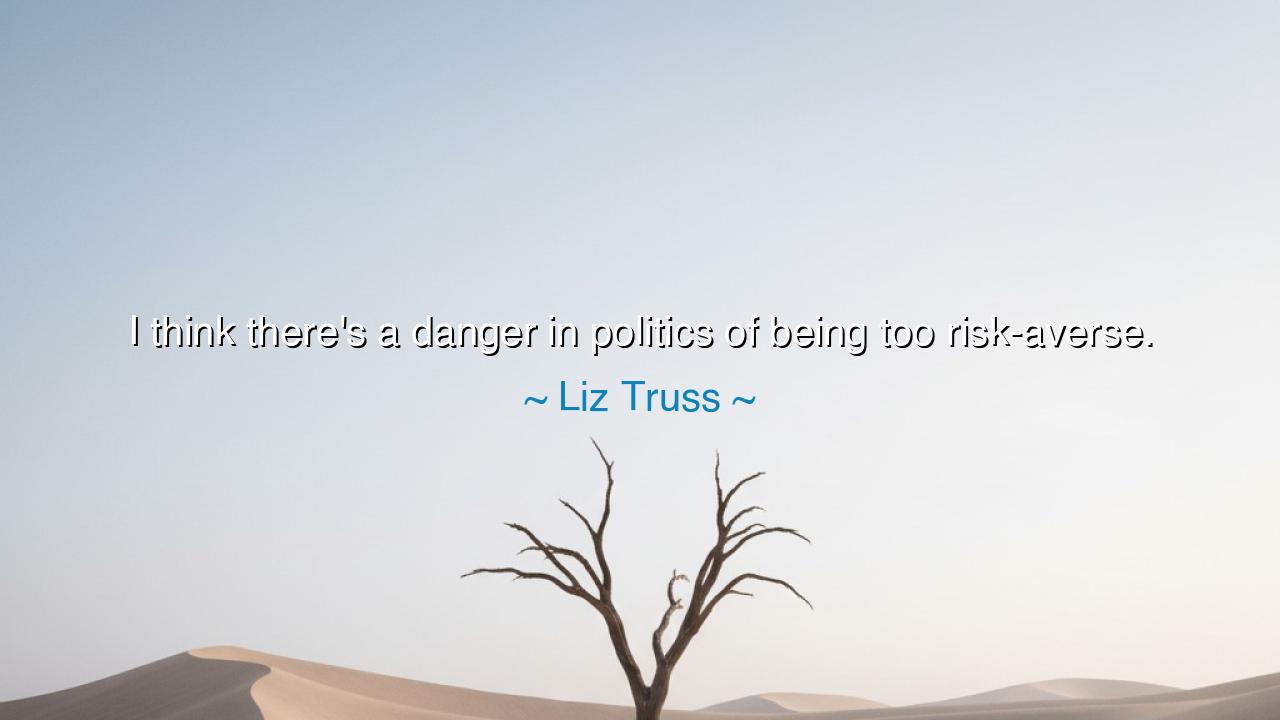
I think there's a danger in politics of being too risk-averse.






The words of Liz Truss — “I think there’s a danger in politics of being too risk-averse.” — strike at the heart of leadership itself. She warns that while caution has its place, an excess of fear shackles the spirit of progress. In politics, as in life, there are moments when hesitation is not wisdom but cowardice, when the refusal to risk becomes the refusal to lead. For a people cannot be guided by timidity; they require vision, daring, and the courage to walk paths where no footprints yet exist.
The meaning of this teaching is that true governance demands balance. Prudence may preserve stability, but risk-taking creates transformation. Great reforms, bold alliances, and daring solutions are never born of those who cling only to safety. The leader who fears failure above all else will accomplish little, leaving society stagnant. Thus Truss reminds us that excessive caution in politics is not neutral; it is itself a danger, for it denies the possibility of growth.
History bears witness to this truth. Consider Abraham Lincoln, who risked division and war by standing firm against the spread of slavery. Many counseled compromise, urging caution to avoid conflict, but Lincoln understood that avoiding risk would mean surrendering the nation’s soul. His courage brought trial and bloodshed, yet it also birthed renewal and freedom. By contrast, leaders who have clung to safety at all costs — those who sought only to appease or delay — often left their nations weakened, for timidity seldom withstands the storms of history.
The origin of Truss’s reflection lies in the modern world, where leaders are often paralyzed by fear of criticism, scandal, or short-term loss. Surrounded by polls, advisers, and the constant scrutiny of media, many choose the path of least resistance. Yet she speaks to remind us that leadership requires more than management: it requires the will to act boldly, even when the outcome is uncertain. For without risk, politics becomes little more than administration, stripped of vision.
Therefore, O seekers of wisdom, learn this: risk is the companion of greatness, while fear is the ally of decline. In the councils of power and in the choices of daily life, beware the prison of over-caution. Let prudence guide your steps, but let courage set your direction. For as Truss teaches, the true danger in politics is not the risk of failure, but the refusal to dare — for nations that will not risk cannot rise, and leaders who will not dare cannot lead.






GNtran pham gia nghia
Liz Truss’s statement about the danger of being too risk-averse in politics makes me think about the current political climate. Leaders often seem afraid to make tough decisions that might alienate certain groups. But can society afford leaders who are always playing it safe? What would it take for leaders to embrace risk in a way that benefits everyone, and how do we create a political environment where this is possible?
HPChung Hieu Phan
Risk aversion in politics can often feel like it leads to indecisiveness or half-hearted solutions. Liz Truss makes a good point about the dangers of avoiding risk, but what about the risks of taking the wrong actions? How do we distinguish between risky decisions that can lead to progress versus reckless choices that could have harmful effects? Is there a way to foster more calculated risk-taking in politics while still protecting the public interest?
TXTran Thanh Xuan
It’s interesting that Liz Truss points out the dangers of being too risk-averse in politics. It seems like politicians often focus on playing it safe to avoid criticism, but that doesn’t always lead to meaningful change. How do we change the culture of political decision-making so that leaders are encouraged to take bold actions for the future, without being paralyzed by fear of consequences? Can we build a political environment that values courage and innovation?
Vvutrinh
I agree with Liz Truss that too much risk aversion in politics can hold us back. Progress often requires stepping out of the comfort zone, but isn’t there a fine line between risky innovation and reckless decision-making? How do we make sure that political risks are well-calculated and not just a result of ambition or desperation? What systems could we put in place to support leaders in taking meaningful risks?
DABui huynh duc anh
This quote from Liz Truss raises an interesting point. Risk-averse politics can sometimes result in missed opportunities, as leaders hesitate to make difficult but necessary decisions. But at the same time, taking risks in politics often comes with significant consequences. How do we ensure that the right risks are being taken for the greater good, and that leaders are accountable when they take those risks?